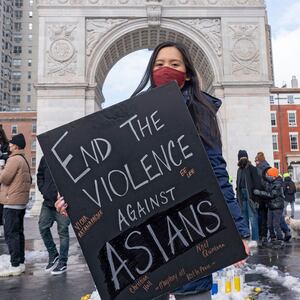A controversial law professor at the University of Pennsylvania is taking heat—yet again—for her racist comments.
This time, Amy Wax was called out for being xenophobic in a recent interview with Glenn Loury, a social sciences professor at Brown University, and was quick to clap back at her critics. But her “defense” only made things worse, when she directly stated that because “most” Asian Americans support Democrats, “the United States is better off with fewer Asians and less Asian immigration.”
The social media backlash was swift, with former President Donald Trump’s niece Mary Trump even chiming in.
ADVERTISEMENT
“It helps explain the situation this country finds itself in that an Ivy League university allows the morally and intellectually bankrupt racist #AmyWax teach the next generation of American lawyers. There should be consequences for this kind of hateful rhetoric @pennlaw,” she wrote.
Penn Law School Dean Theodore Ruger addressed the controversy in a statement on Monday, calling Wax’s comments “anti-intellectual” and “racist.”
“Like all racist generalizations, Wax’s recent comments inflict harm by perpetuating stereotypes and placing differential burdens on Asian students, faculty, and staff to carry the weight of this vitriol and bias,” he said.
It all started with the Dec. 20 episode of The Glenn Show, during which Wax discussed U.S. immigration, insisting that it’s difficult to welcome people into Western societies if they do not share the same values—an idea she also shared in a recent speech.
“It’s just harder to assimilate those people or to have confidence that our way of life will continue if we bring a lot of people in who are not familiar with it. These are not original ideas on the [political] right,” Wax told Loury. “This might result in a shift in the racial profile of people who come in. Obviously, we’ll have fewer people from Africa. We’ll have fewer people of some parts of Asia, and it’ll be more white—not that many white people want to come to the United States.”
Specifically, Wax referred to South Asian elites migrating to the U.S., whom she differentiated from migrants traveling from Latin America.
“[We] have to distinguish mass-immigration, which we’re getting from the Hispanics, south of the border, which I think poses different questions and challenges from the Asian elites that we’re getting,” she said. “It doesn’t mean that the influx of Asian elites is unproblematic. I actually think it’s problematic. …I think it’s because there’s this…danger of the dominance of an Asian elite in this country, and what does that mean? What is that going to mean to change the culture?
“Does the spirit of liberty beat in their breast?” she continued.
Wax considered the spirit of liberty to be “people who are mistrustful of centralized concentrations of authority who have a kind of ‘don’t tread on me’ attitude, who are focused…on our freedoms, on our liberties, on sort of small scale personal responsibility who are non-conformist in good ways.”
The law professor noted that the idea of “wokeness” is an elite ideology and that “Asians tend to be more conformist to whatever the dominant ethos is.”
Then, Wax railed against Indians who stay in America after complaining that the country is racist.
Her comments did not bode well with Loury’s audience.
Loury posted an email he received from listener George Lee, who said he generally opposes undocumented immigration and usually agrees with Wax. But her latest rant “disturbed” him.
“It is a bad thing for America to bring in immigrants who oppose America's basic values,” Lee concurred. “But…race and national origin are very poor proxies for cultural values that should be kept out of America.”
Lee elaborated on the Asian immigrants who made racial strides in America, “who pounded the pavement and hit the airwaves to help stem the tides of racial essentialism and collective judgment in proposed legislation, ballot initiatives, and elections.”
“By many accounts, Asians were key marginal contributors to some of these successes,” he said. “Asians do contribute to America’s scholarly, technological, and economic competitiveness, whose benefits we all share.”
Wax then issued a rebuttal, saying Lee is “too optimistic about the influence of Asians and Asian immigrants.”
“In the case of Asians in the U.S., the overwhelming majority vote Democratic,” Wax argued. “I find Asian support for these policies mystifying, as I fail to see how they are in Asians’ interest. We can speculate (and, yes, generalize) about Asians’ desire to please the elite.”
“As long as most Asians support Democrats and help to advance their positions, I think the United States is better off with fewer Asians and less Asian immigration,” she added.
Wax’s anti-Asian comments soon went viral on social media.
Current Affairs Editor Nathan Robinson tweeted, “University of Pennsylvania law professor Amy Wax, who insisted she was not a racist despite praising the superiority of ‘European’ culture, now argues that the US needs ‘fewer Asians’ and we need to be asking ‘how many Asians are too many.’”
“The most ironic part of this is that Wax complains about the decline of ‘bourgeois values,’ but then is opposed to the immigrant group (Asians) that are knocking it out of the park when it comes to those values (academic achievement, entrepreneurship, family focus, etc),” another Twitter user posted.
Writer and scholar of race relations in history and law Brando Simeo Starkey wrote, “I’ve had the misfortune of having dinner with her in a group setting. She’s absolutely racist.”
In his statement, Dean Ruger said that while “Wax’s speech may be protected,” that doesn’t “permit this Law School to ignore the real harms such speech causes.”
“Wax’s views are diametrically opposed to the policies and ethos of this institution,” he added. “They serve as a persistent and tangible reminder that racism, sexism, and xenophobia are not theoretical abstractions but are real and insidious beliefs in this country and in our building. This reality sharpens and deepens our commitment to support our community as we continue to work to advance equity and inclusion."
The Washington Post reported that Wax has previously faced backlash for falsely claiming that Black students in their classes are rarely among the most successful students at Penn.
“I don’t think I’ve ever seen a Black student graduate in the top quarter of the class, and rarely, rarely, in the top half,” she said in a 2017 interview with Loury.
Due to Wax’s comments, Ruger said that the professor would no longer teach required courses but only instruct electives.
“Black students have graduated in the top of the class at Penn Law,” Ruger said. “Contrary to any suggestion otherwise, Black students at Penn Law are extremely successful, both inside and outside the classroom, in the job market, and in their careers.”
In her latest talk with Loury, Wax claimed that alumni of color are trying to get her fired.







